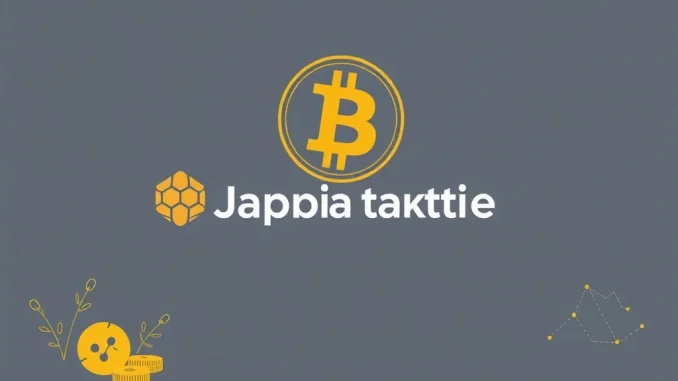
A seismic shift is underway in the corporate world, and it’s not just tech giants making headlines. The latest surprising move comes from Japan, where Kitabo Co., a venerable textile materials company, has announced a groundbreaking plan to allocate ¥800 million (approximately $5.4 million) towards a substantial Bitcoin investment. This bold decision, initially reported by @btcNLNico on X, marks a significant pivot in the company’s treasury strategy and sends a powerful signal about the evolving perception of digital assets in traditional industries.
What is Driving This Bold Corporate Bitcoin Adoption?
For decades, corporate treasury management has largely stuck to conventional assets like cash, bonds, and traditional equities. So, what’s compelling a textile company like Kitabo to venture into the volatile world of Bitcoin? This move isn’t isolated; it reflects a growing trend among forward-thinking companies seeking innovative ways to manage their capital and hedge against economic uncertainties. Several factors might be at play:
- Inflation Hedge: With global inflation concerns persisting, companies are looking for assets that can potentially preserve or grow purchasing power. Bitcoin, often dubbed “digital gold,” is increasingly seen as a viable hedge.
- Diversification: Adding Bitcoin to a treasury offers diversification away from traditional financial instruments, potentially reducing overall portfolio risk.
- Future-Proofing: Embracing digital assets can position a company at the forefront of financial innovation, appealing to a new generation of investors and partners who are digitally native.
- Balance Sheet Optimization: Holding a portion of treasury in Bitcoin can offer potential upside, especially if the company believes in Bitcoin’s long-term appreciation.
Kitabo’s decision underscores a strategic recognition of Bitcoin’s potential, moving beyond speculative trading to a more fundamental integration into their financial planning. This isn’t just about buying a digital currency; it’s about a fundamental re-evaluation of corporate Bitcoin adoption as a legitimate treasury asset.
The Significance of Japanese Company Bitcoin Moves
When a Japanese company Bitcoin purchase makes headlines, it carries particular weight. Japan has a unique relationship with cryptocurrency, being one of the first major economies to regulate it. While the country has seen its share of crypto enthusiasm and challenges, a traditional company like Kitabo making such a move signals a maturing landscape.
Historically, Japanese corporations have been known for their conservative financial strategies. Kitabo’s decision could pave the way for other Japanese firms to consider similar treasury adjustments. This move could also influence regulatory perspectives, potentially fostering a more accommodating environment for digital asset integration within the corporate sector. It’s a testament to Bitcoin’s increasing mainstream acceptance, even in economies known for their caution.
Is This a New Trend in Digital Asset Strategy?
Absolutely. Kitabo’s venture into Bitcoin isn’t an isolated incident but rather a significant indicator of a broader shift in digital asset strategy among corporations worldwide. We’ve seen major players like MicroStrategy lead the charge, accumulating substantial Bitcoin holdings. While Kitabo’s $5.4 million purchase might seem modest compared to some, it’s substantial for a textile company and highlights that this trend isn’t confined to tech or financial firms.
This evolving strategy often involves a multi-faceted approach:
- Exploration: Companies first research and understand the risks and opportunities associated with digital assets.
- Allocation: A percentage of treasury funds is allocated to Bitcoin or other cryptocurrencies.
- Integration: Digital assets are integrated into financial reporting and risk management frameworks.
- Long-Term Vision: The investment is viewed as a long-term strategic hold rather than a short-term trade.
This trend signifies a growing confidence in the long-term viability and value proposition of cryptocurrencies, moving them from the fringes of finance to the core of corporate balance sheets.
The Potential Impact of Kitabo Bitcoin Purchase
What does the Kitabo Bitcoin purchase mean for the company itself and the broader market? For Kitabo, it’s a bold statement of innovation and adaptability. It could:
- Enhance Brand Image: Position Kitabo as a forward-thinking company, potentially attracting new talent and investors interested in modern financial practices.
- Potential for Capital Appreciation: If Bitcoin continues its upward trajectory, the investment could significantly boost Kitabo’s financial health.
- Increased Scrutiny: The company will likely face increased scrutiny from shareholders and financial analysts regarding its digital asset holdings.
For the market, Kitabo’s move adds another data point to the narrative of institutional adoption. Each new corporate entry into Bitcoin reinforces its legitimacy and scarcity, potentially contributing to its long-term price appreciation. It’s a ripple effect that could encourage other companies, especially in non-traditional sectors, to explore similar avenues.
Navigating the Future of Bitcoin Investment
Kitabo’s foray into Bitcoin highlights the increasing acceptance of Bitcoin investment as a legitimate component of corporate finance. However, it’s crucial to acknowledge that such investments come with inherent risks, primarily due to Bitcoin’s price volatility. Companies undertaking this path must have a robust risk management framework in place, clear objectives, and a long-term perspective.
The future of corporate treasury management is clearly evolving. While traditional assets will remain foundational, digital assets like Bitcoin are carving out a significant niche. Kitabo’s strategic move is a testament to the ongoing maturation of the crypto market and its growing influence on global corporate finance. It’s an exciting time to watch how traditional industries continue to embrace the digital revolution.
Summary: A Textile Titan’s Crypto Leap
Kitabo Co.’s decision to invest $5.4 million in Bitcoin marks a pivotal moment, showcasing the accelerating trend of corporate Bitcoin adoption. This strategic move by a Japanese textile company not only diversifies its treasury but also underscores the growing global confidence in digital assets as a legitimate component of modern financial strategy. As more companies explore Bitcoin investment, Kitabo’s bold step could inspire a new wave of traditional businesses to embrace the future of finance, cementing Bitcoin’s role in the global economy.
Frequently Asked Questions (FAQs)
1. Why is a textile company like Kitabo investing in Bitcoin?
Kitabo’s decision to invest in Bitcoin is likely driven by a desire for treasury diversification, a hedge against inflation, and a strategic move to future-proof its financial strategy by embracing digital assets. Many companies are exploring Bitcoin as a non-traditional store of value and a potential growth asset.
2. What does “corporate Bitcoin adoption” mean?
Corporate Bitcoin adoption refers to traditional companies integrating Bitcoin into their balance sheets or treasury strategies. This can involve purchasing Bitcoin as a reserve asset, accepting it for payments, or incorporating blockchain technology into their operations. It signifies a growing mainstream acceptance of cryptocurrency.
3. Is this a common trend among Japanese companies?
While Japan has been progressive in crypto regulation, large-scale corporate Bitcoin adoption by traditional Japanese companies has been less common compared to some Western counterparts. Kitabo’s move is significant because it could signal a shift and encourage other conservative Japanese firms to consider similar strategies.
4. What are the potential risks of a Bitcoin investment for a company?
The primary risk is Bitcoin’s price volatility, which can lead to significant fluctuations in the value of the company’s holdings. Other risks include regulatory changes, cybersecurity threats, and liquidity challenges if a large amount needs to be converted quickly. Companies must implement robust risk management strategies.
5. How does this affect Kitabo’s overall digital asset strategy?
This $5.4 million Bitcoin purchase represents a significant step in Kitabo’s evolving digital asset strategy. It indicates a commitment to exploring and leveraging new financial instruments, potentially paving the way for further integration of blockchain technologies or other cryptocurrencies into their business operations in the future.



